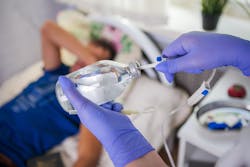Statins likely not helping to reduce COVID-19 severity
The findings from a recent Johns Hopkins Medicine-led study of nearly 4,500 patients hospitalized with COVID-19 over a four-month period suggests that statins likely do not confer any impact — positive or negative — on COVID-related mortality and may be associated with a significantly increased risk — nearly 1 chance in 5 — of more serious illness.
The study’s findings contradict recent small-sample studies (fewer than 200 patients) that have suggested that statins — drugs that lower levels of low-density lipoprotein (LDL), a form of cholesterol linked to heart disease and stroke — may reduce the chances of severe disease or death from COVID-19, the university said in a news release.
The new study was published in the journal PLOS ONE.
In the study, researchers reviewed the records of 4,447 patients, ages 18 years or older, hospitalized at five medical facilities in the Johns Hopkins Health System who had been diagnosed with SARS-CoV-2 infection between March 1 and June 30, 2020. Of these, 594 (13%) were receiving statins at admission. Statin users were mostly men (57%) and older (ages 52–78 compared with ages 29–62) than the non-statin users. The largest percentage of statin users were Black (47%), had hypertension (74%) or diabetes (53%), and were more likely to take medications for lowering blood pressure — along with statins to reduce their LDL cholesterol.
To be counted toward COVID-19-related mortality, death had to occur as a result of the disease during the hospital stay. The researchers defined a case of severe COVID-19 as one in which a patient had a prolonged hospital stay of more than a week or required invasive medical ventilation to breathe.
After accounting for other known factors that might skew the data, the researchers found statin use had no significant effect on mortality from COVID-19. However, they did find that patients hospitalized with COVID-19 and taking statins had an 18% increased risk for having a more severe form of the disease than patients who did not take cholesterol-lowering agents.
“One plausible explanation for this finding is that statins increase cellular production of angiotensin-converting enzyme 2 [commonly known as ACE2], the receptor on a cell’s surface through which SARS-CoV-2 gains entry,” says Petros Karakousis, MD, Professor of Medicine at the Johns Hopkins University School of Medicine. “Therefore, statins may lower a cell’s resistance to infection and in turn, increase the odds that the patient will have a more severe case of COVID-19.”

